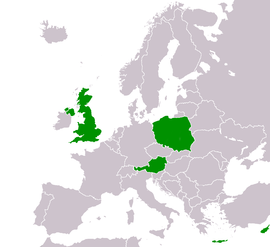Empire of Celestia
This article refers to a nation which is currently in a state of inactivity. You can help make the article reflect that or ask on the talk page for further information. |
| Empire of Celestia Imperium Celestiae | |||||
| |||||
| Anthem: By the blood-soaked ground we stand! | |||||
| Motto: Dulce et Decorum es pro patria mori | |||||
 | |||||
| Official language(s) | Polish | ||||
| Spoken language(s) | English German Greek | ||||
| Ethnic groups | Polish British | ||||
| Demonym | Celestian | ||||
| Capital | Oldsville | ||||
| Largest city | Oldsville | ||||
| Government | Absolute hereditary monarchy | ||||
| Emperor | Celestine III | ||||
| Legislature | Imperial Council | ||||
| - Upper house | Senate | ||||
| - Lower house | Sejm | ||||
| Currency | Celesto | ||||
| Formation | |||||
| - Foundation | 11 November 2010 | ||||
| - Disestablishment | 27 July 2012 | ||||
| - Re-Establishment | 11 November 2012 | ||||
| Area Claimed | |||||
| - Total | 104.2 sq mi (269.8 km2) | ||||
| Population | |||||
| - Citizens | 23 (2012 census) | ||||
| - Total | 39 | ||||
| Time zone | GMT+1 (Eastern European Time) | ||||
| Footnotes: | Former member of the MEU. | ||||
Celestia, officially the Empire of Celestia and the Free Realms, is a micronation situated in Europe, holding multiple territorial claims within several countries within Europe, including the United Kingdom and Austria. Celestia is an absolute monarchy, wherein the total political power is held by the sovereign of the micronation, the Emperor. The capital of Celestia is Oldsville, which has a population of approximately 3,130 inhabitants. Celestia is an old micronation, having been formed in early 2010, and has at one point been a member of the Micronational European Union (MEU), however, it withdrew due to micronational inactivity, but also due to political unrest within the state. Celestia held a key position in the organisation of the MEU as well as its maintenance. In mid-2011, Celestia became inactive as a micronation due to "political instability and lack of micronational interest", after which it migrated to Microwiki where it aims to continue its micronational existence, but also aid in upkeeping the micronational community. As of late 2012, Celestia has reformed and reorganised the political system of the micronation and has, again, become active within the micronational community.
History
Pre-micronational
Celestia was founded on the 11th of November, 2011, by a group of politically interested persons, who aimed to establish their own government in order to recreate a fully functioning state. The idea of a micronation was very suited to the concept and the group, known as the Imperial Association, formed the first government of the Republic of Celestia. The micronation established its existence on a forum where it continued to grow and attract intermicronational attention up until early 2012 when increasing political instability led to talks over political reform. The initial Imperial Association was disbanded and the most influential and politically strong member took over control of the state after several Imperial Cabinet members lost interest in the micronation and many others did nothing to prevent the coup. The new leader transformed Celestia into an Empire and instituted an absolute monarchy, by which he has absolute power over all political and government matters within the Empire, claiming that it would result in no future management problems.
Absolute monarchy
Under the new political system, the Empire thrived and established diplomatic relations with various other micronations on a new-found forum, to which Celestia has migrated to. The new rule oversaw the drafting of a Constitution, which did not limit the power of the monarchy but provided numerous necessary rights and protections for citizens, the founding of an Imperial Council, a bicameral legislative organ that was designed to improve the monarch's political orientation within the state, and the Supreme Tribunal, the judiciary branch of the Imperial Council, which deems potential Acts or Bills in accordance to the Constitution or not. The opposition of the Imperium (that is the governing organ, i.e. the Emperor) have criticised the Constitution of being "a farce" and a "scheme, designed to tame the senses of Liberal revolutionaries", however, the Constitution proved a necessary element of the absolutist State when it helped to solve to key Council cases, as well as providing the foundation of a public Civil Service.
Micronational decline
As the Empire prospered, signs of growing political unrest were becoming more frequent and agitating the peaceful governing of the nation. The political attacks enticed by Liberal revolutionaries were increasingly violent and could not have been met with army intervention without strong castigation of the monarchy being "an autocratic dictatorship worthy of 19th century Russia". The magnitude of the demonstrations led the Emperor to allow for peace talks that ultimately led to the unwanted army intervention, which in turn led to the decline of Celestia, which had ceased to be admonished and began to be harshly criticised for the "unnecessary violations" aimed at "the Ordinary Citizen". The response of the State to the protests had been received poorly by the micronational community and caused Celestia to cease all diplomatic relations within the micronational community. A final demonstration on the 27th July 2012, led to the dissolution of the Empire of Celestia, therefore resulting in periodical micronational inactivity.
Reformation and present
After the protests initiated by the Liberal revolutionaries, which led to the disestablishment and inactivity of Celestia, the micronation became inactive for almost 4 months in which the Emperor gradually decided to restructure and recreate the fallen Empire. The official Declaration of Reformation and the Joint Imperial Ordinance was signed on the second anniversary of the formation of the initial Empire of Celestia, the 11th of November, 2012. The government migrated from the old forum and joined MicroWiki were it now continues its micronational political existence and aims to form a more perfect government and actively engage in micronational affairs.
Government and Politics
Political sphere
Celestia is an absolute monarchy with a Constitution designed to provide basic rights and protections for its citizens, however, it does not restrict the power of the monarch, who is largely considered an autocrat. The absolutist system replaced the republican government after many conflicts of interest came about due to multiple bodies governing the State. In response to the conflict, the reformations to the system of government put in place transformed the quasi-democratic system into an absolute monarchy. This move at first appeared dictatorial, however, in the long-run, it managed to avoid many crises in regards to governing and administration of Celestia and the nation still retained some form of democracy with the establishment of the bicameral legislating body, which passes on advice regarding legislation, judiciary, and economic factors of the state.
The bicameral Imperial Council consists of the Senate and the Sejm (Seym), the Upper and Lower Houses respectively. The Sejm comprises 6 members who have equivocal political power within the legislative boundaries of the Sejm, and are all skilled in a particular aspect of governing the State, such as economical, political, social. The Sejm is obliged to hold meetings every 3 months in a year that must last 66 hours, which can be spread over a period of maximum of 2 weeks. Each session draws up a Prospective Bill of Governing, which is a collection of the salient points regarding what had been discussed over the Sejm session. The Senate consists of 3 members, which is paramount to its role as a decidiary body. Each Senator has equal voting power, however, they are not permitted to abstain from voting on the proposals in the Prospective Bill of Governing, known commonly as the Prospectus. The need for an odd number of Senators is key as it allows for a democratic decision on the legislation incrediments.
Foreign relations
In its past, Celestia held diplomatic relations with a vast amount of other micronational entities, however, any form of relations with these States had been forsaken in response to the political assaults on Celestia in midst of the 2012 Crisis that led to the eventual disestablishment of the Empire, in which Celestia was forced to use armed force against radical revolutionaries as a reply to constant provocations and political agitations, which caused political unrest, and was castigated by an intermicronational commonwealth body. Celestia is currently in the process of recreating its foreign relations and is open to all diplomatic talks with any micronation in the MicroWiki community.
The Empire of Celestia formally maintins the following micronational relations and statuses:
| Nation | Relation status | Notes |
|---|---|---|
| Recognised | None | |
| Recognised | None | |
| Disputed | Disputes Emperor's claims as a descendant of "Princes of Prussia and Barons of Norway" on the basis of a lack of factual evidence. | |
| Semi-recognised | Recognises the micronation as an autonomous state, however disputes several factual incongruencies. | |
| Recognised | Recognised as a sovereign state independent from Israel. | |
| Recognised | Recognised as an independent, self-governing, international entity. | |
| Disputed | Disputes King's claims as a "Grand Duke of Warsaw" with no such title ever in existence and with lack of factual evidence to support the King's claim as a member of the Royal Saxon house, which, in turn, still does not give him pretences to the inexistent title. |
Economy

The economy of Celestia relies mainly on donations from users of the Imperial Servers, which host online games, file sharing and a gaming-related forum. As of 2012, the real Gross Domestic Product of Celestia was 240U, which amounts to approximately $12. This figure was much above the predictions carried out by the Imperial Council as the estimated amount was much lower due to the political crisis that the nation was facing. In spite of the difficulties, the economic income remained higher than estimated and the profits will potentially allow for expanding capital to another server. The purchase of the second server would largely steepen the trend output of the Celestian economy as it would cause a 100% increase in the productive capacity of the economy and allow for a less volatile actual output.
In its early days Celestia struggled with hyperinflation, which was managed through the implementation of slightly dictatorial policies, such as maximum price. From about a 220% rate of inflation the figure was brought down to approximately 140% in 2 months with the help of a newly established Monetary Assessment Committee, which carried out numerous economic reforms to ameliorate the conditions within the national economy. As of early 2013, inflation has been measured at 34%, a staggering drop that caused troublesome deflationary pressure. The Monetary Assessment Committee aims to hold inflation at about 25% to ensure that no more deflation occurs. The Imperial Council has currently banned any loans from the Treasury in order to avoid a fiscal crisis as the government struggles to operate within the current budget plan, which potentially opens up a scheme of fiscal reforms and government injections.
Free market and command market
Over the course of its existence, the Celestian economy has been strongly free-market and characterised itself with low taxes, small amounts of government regulation, and equity trust funds. This economic configuration did not, however, do particularly well during the 2008 Financial Crisis and command economy measures, such as restricted output and maximum price policies, had to be implemented. Gradually, the command market policies had been removed, however, some are still in place as a measure of increasing the effectiveness of the national economy. For example, from 2011 to 2012, the prices of 100MB data allowance on the national server for gaming had gone up from 16U to 28U. The change in price did not result in a sharp downfall of the demand for server slots, proving that the National Server System is, in fact, a price-insensitive good, and PED was measured at roughly -0.23 in relation to a previous -0.47.
Trade and commerce

Celestia is not a strong exporting economy and the range of products sold are usually virtual goods (ex. in-game money, in-game bonuses, server bonuses, etc.), however, Celestia also sells a variety of home-produced goods from lemonade on charitable sales to home-baked Celestian bread. Even with naturally minute trade, the government aims to keep trade at the largest minimum possible in order to avoid a balance of payments deficit, which would most probably lead to the collapse of the Celestian economy. In light of emerging international competition from new markets, such as the BRIC association, the Emperor had asserted that pursuing an exporting policy would be "unwise" and have "drastic results" on the domestic economy. The Monetary Assessment Committee has repeatedly stated that "assuming a new policy in regards to export may result in international agitation towards BRIC economies, which would certainly respond with predatory pricing strategies", but also mentioned the risks of allowing large imports to prompt imported inflation, which then would ultimately result in the re-emerging of hyperinflation, which had caused terrible crises in the early years of the Empire.
Geography
Climate
Celestia's climate is humid continental, almost oceanic, with cold winters and warm summers. The average temperature is −3 °C (27 °F) in January and 26 °C (91.4 °F) in July. Temperatures may often reach 30 °C (78.8 °F) in the summer. Spring and Autumn are usually beautiful seasons, the former crisp and sunny and full of blooms and the latter alternately sunny and misty, and cool but not cold with a temperature of approximately 21 °C (69.8 °F) on average. Annually, Celestia experiences a rainy season in which a continuous downpour may occur for 7–11 days, with the amount of precipitation varying from year to year.
| Empire of Celestia Climate Data | |||||||||||||
|---|---|---|---|---|---|---|---|---|---|---|---|---|---|
| Month | Jan | Feb | Mar | Apr | May | Jun | Jul | Aug | Sep | Oct | Nov | Dec | Year |
| Average high °C (°F) | 0.1 (32.2) |
0.9 (33.6) |
4.7 (40.5) |
12.2 (54) |
19.4 (66.9) |
21.7 (71.1) |
32.7 (90.9) |
26.1 (79) |
16.1 (61) |
8.2 (46.8) |
4.4 (39.9) |
-0.5 (31.1) |
17.6 (73.7) |
| Average low °C (°F) | -6.1 (21) |
-5.5 (221) |
-1.3 (29.7) |
4.2 (39.6) |
9.7 (46.5) |
24.8 (76.6) |
25.1 (77.2) |
24.9 (76.8) |
14.8 (58.6) |
8.2 (46.8) |
2.9 (37.2) |
-3.1 (26.4) |
4.2 (39.6) |
| Precipitation mm (inches) | 21 (0.83) |
25 (0.98) |
24 (0.94) |
33 (1.3) |
44 (1.73) |
62 (2.44) |
73 (2.87) |
63 (2.48) |
42 (1.65) |
37 (1.46) |
38 (1.5) |
33 (1.3) |
495 (19.49) |
| Avg. rainy days | 15 | 14 | 13 | 12 | 12 | 13 | 13 | 12 | 12 | 13 | 14 | 16 | 159 |
Landscape
The Empire of Celestia consists of five realms, which are united under the Emperor as the sovereign of all the 5 states. Due to this, Celestia has a varying landscape with urban flatlands in the realm located in the United Kingdom, mountainous ranges located in the realm within Austria, and densely saturated woodlands in the eastern part of the Empire in Poland. Celestia also has access to sea on the Mediterranean due to the territorial claims it holds on Cyprus and Malta, which provide direct access to water and refute the Empire's status of a land-locked micronation. The volatile differences in the geographical climates in the Empire allow for the harvesting of a wide variety of crops and plants, which is supportive to the economy as imports can be kept to a definite null. This also allows Celestia to be a self-sustaining nation that does not rely on foreign help, humanitarian or financial alike.

Celestia also has a fluctuating topography with mountainous terrain in the Austrian part of the Empire, but, contrastingly, a relatively flat landscape in areas of the Empire that are located in the United Kingdom or Poland. The difference in the altitude at specific areas of the Empire also allows for a pressure difference, which aids in the existence of the vast ranges of plants and other botanical species. The most common tree in the aggregate territory of the Empire is the common birch (betula pendula), which covers most of the woodland area of the Empire, however other common trees include the oak (quercus) and the pine (pinus). The most common plant is the family group of the camomiles, which dominate the grasslands and meadows in all geographical locations of the Empire, albeit numerous other frequent flowers saturate the meadows in the Empire. Celestian soil has a slightly lower than neutra pH (6.3) due to key minerals present in the soil, such as ammonia and potassium, which are vital for plants and allow for healthier flowers.
Territory

The Empire of Celestia holds territorial claims in multiple countries in Europe on the basis of property that had been purchased by the Imperial family. The five stars on the Celestian flag represent the 5 countries in which the Empire maintains its territorial sovereignty: Britain, Austria, Poland, Cyprus, Malta. The amount of land held in each country varies; the largest territory held by the Empire is located in Poland, the smallest in Malta. The Empire kept former territorial claims in the Republic of Seychelles, however, the land had been forfeited when it was sold to the Emir of Abu Dhabi to be used for the construction of his palace. The government and the Imperial Council are both located in Oldsville, which is in Polish territory of the Empire from which the Empire is governed. Given that the territory held in Poland is the largest, this solution is most efficient and ergonomic for the Empire.
The territory that the Empire of Celestia holds autonomy over is not the same as the territory that the Empire claims is rightly theirs. Whilst the total area of Oldsville, along with the outskirts, is approximately 26 km2, the Empire asserts its control over a larger area of approximately 370 km2 as a land governed by the Empire, but not as land that is part of the Empire. The lack of this distinction in public information has caused numerous territorial disputes in the past, therefore needing large amounts of clarification with the micronational community.
Demographics
Celestia has a population of a total of 39 inhabitants, from which 23 are full-time citizens, whereas the remaining 16 are government officials and the Imperial family. The Empire has a population density of approximately 0.1445 inhabitants per square kilometer, with a population that is scattered across the whole territory. The population density varies based on the province of the Empire with the Polish territory being the most densely inhabited, and the Maltese territory being the least inhabited.

The official religion in the Empire of Celestia is Roman Catholicism. This is due to strong Catholic roots originating from Poland, which initially became a country due to the First Baptism in 966. The Catholic faith in the Empire stems largely from just the Polish influence that is inherent in the Empire. Other religious denominations that Celestia consists of are Protestants due to the presence of Protestant followers in the United Kingdom territory. In recent years, Celestia also had a small Muslim minority due to the territory in Cyprus, however the representants of that religion left the Empire in mid-2011. As of that time, Christianity, both Catholics and Protestants, are the only religious groups in the Empire.
Due to the geographical diversity of the Empire, Celestia recognises 6 languages as common languages in the Empire: English, Polish, Greek, French, Maltan, and Italian. The administrative language in Celestia is Polish due to the state government being located in the Polish landmass of the Empire. The linguistic diversity of the Empire leads to the development of a Celestian dialect, which is an amalgamation of common phrases and words that the official spoken languages have in common. It is not a frequently used language, and it is very hard to learn, however, some percentage of the population recognise it as an official language within the boundaries of the Empire and may even choose to converse in it.

